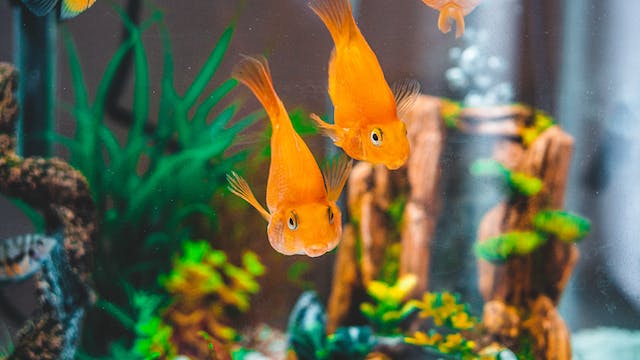Table of Contents
If you’re a betta fish owner, you may wonder whether tap water is safe for your fish. The answer is not a simple yes or no. While tap water can be safe for bettas, it depends on several factors.
Firstly, the quality of your tap water matters. Municipal water supplies are treated with chemicals such as chlorine and chloramine to kill harmful bacteria and viruses. These chemicals are toxic to fish, so it’s important to treat tap water before adding it to your betta’s tank. Additionally, tap water may contain heavy metals and other contaminants that can harm your fish.
Understanding Betta Fish
Betta fish, also known as Siamese fighting fish, are freshwater fish that are native to Southeast Asia. These fish are known for their beautiful colors and flowing fins, and are a popular choice among fish enthusiasts.
If you’re considering getting a betta fish, it’s important to understand their unique needs and behaviors. Here are some key things to keep in mind:
Betta Fish Care
Betta fish require proper care to ensure they stay healthy and happy. Here are some important things to consider:
- Tank size: Betta fish need at least a 5-gallon tank to swim around comfortably.
- Water quality: Betta fish are sensitive to water conditions, so it’s important to keep their tank clean and well-maintained.
- Diet: Betta fish are carnivorous and require a diet of high-quality fish food or live/frozen foods.
- Temperature: Betta fish are tropical fish and require a water temperature between 78-82°F.
- Tank setup: Betta fish prefer a tank that is heavily planted with plenty of hiding spots.
Betta Fish Breed and Colors
Betta fish come in a wide variety of colors and patterns, including red, blue, green, yellow, and purple. There are also different types of betta fish, including veil tail, half-moon, and crown tail.
If you’re interested in breeding betta fish, it’s important to do your research and understand the process. Breeding betta fish can be challenging and requires a lot of work and dedication.
Keeping Your Betta Fish Healthy
To keep your betta fish healthy, it’s important to monitor their behavior and look out for any signs of illness. Some common signs of illness in betta fish include:
- Lethargy
- Loss of appetite
- Clamped fins
- Discoloration
- Rapid breathing
If you notice any of these symptoms in your betta fish, it’s important to take action right away. Consult with a vet or a fish expert to determine the best course of action.
The Importance of Water for Betta Fish
Water is an essential element for the survival of all living organisms, including betta fish. Proper water conditions are crucial for the health and well-being of your betta fish. Betta fish are sensitive to changes in water conditions, so it is important to maintain a stable and suitable environment for them.
The quality of the water is determined by various factors such as pH, GH, KH, temperature, and salinity. The pH level of the water should be between 6.5 and 7.5, which is slightly acidic to neutral. The GH and KH levels should be in the range of 3-5 and 4-8, respectively. The water temperature should be maintained between 76°F and 82°F, and the salinity level should be around 0.5%.
Betta fish are also sensitive to the total dissolved solids (TDS) in the water. The TDS level should be kept below 500 ppm. High TDS levels can cause stress and lead to health problems in betta fish.
Water hardness is another important factor to consider when creating the ideal water conditions for betta fish. Hard water can cause health issues in betta fish, so it is important to maintain a moderate level of water hardness.
Tap Water and Its Characteristics
Tap water is a readily available source of water for your betta fish. However, it is important to understand the characteristics of tap water before using it in your betta fish tank.
Chlorine and chloramine are commonly found in tap water and can be harmful to your betta fish. Chlorine is added to tap water as a disinfectant, while chloramine is a combination of chlorine and ammonia. It is recommended to use a water conditioner that can remove both chlorine and chloramine from tap water before adding it to your betta fish tank.
Tap water also contains minerals that are beneficial for your betta fish. These minerals help maintain the pH balance and provide essential nutrients for your fish. However, excessive amounts of minerals can be harmful and cause health issues for your betta fish.
Heavy metals, pesticides, contaminants, and pollutants can also be present in tap water. These impurities can be harmful to your betta fish and affect their health and well-being. It is recommended to use a water filter that can remove these impurities from tap water before adding it to your betta fish tank.
In summary, tap water can be used for your betta fish, but it is important to understand its characteristics and use a water conditioner and filter to ensure that it is safe and healthy for your fish.
Using Tap Water for Betta Fish
If you’re a new betta fish owner, you may be wondering if it’s okay to use tap water for your fish. The answer is yes, but there are some important things to keep in mind.
To begin with, it is crucial to treat tap water before introducing it into your betta fish’s tank. Tap water comprises chlorine and chloramines, which can be detrimental to fish. Water conditioners or dechlorinators can be utilized to eliminate these chemicals from the water. Sodium thiosulfate is a prevalent component in dechlorinators, which neutralizes chlorine in the water.
When conditioning tap water for your betta fish, make sure to follow the instructions on the product carefully. Over-dosing or under-dosing can be harmful to your fish. It’s also important to let the water sit for at least 24 hours before adding it to your betta fish’s tank. This will allow any remaining chlorine to evaporate from the water.
It’s worth noting that some tap water may contain other harmful chemicals or heavy metals. If you’re unsure about the quality of your tap water, you can have it tested by a professional or use a water filtration system to remove impurities.
Alternatives to Tap Water
If you are concerned about the quality of the tap water in your area, you may want to consider using alternative water sources for your betta fish. Here are some options to consider:
- Distilled water: This type of water is free of minerals and other impurities, making it a good option for betta fish. However, it can also be expensive and may require additional mineral supplements to ensure your fish is getting the nutrients it needs.
- Spring water: This water comes from natural springs and can be a good option if you are looking for a more natural source of water. However, it can also contain minerals and other impurities that may not be ideal for your betta fish.
- Bottled water: Bottled water can be a convenient option if you are looking for a consistent source of high-quality water. Look for brands that are labeled as purified or distilled for the best results.
- Well water: If you have a well on your property, you may be able to use this as a source of water for your betta fish. However, it’s important to have your well water tested regularly to ensure it is free of contaminants.
- Rainwater: Collecting rainwater can be a good option if you want a free and natural source of water for your betta fish. However, it’s important to filter and treat the water before using it to ensure it is free of pollutants.
The Role of Aquarium in Water Quality
When it comes to keeping betta fish, the quality of the water in their tank is of utmost importance. One of the key factors that can affect the water quality is the aquarium itself.
The size of the aquarium plays a crucial role in maintaining water quality. Bettas need a minimum of 2.5 gallons of water to thrive, but a larger tank is always better. A larger tank provides more water volume, which dilutes waste and toxins, leading to a healthier environment for your betta fish.
Another important factor is the presence of a fish tank heater. Bettas are tropical fish and require a consistent water temperature between 75 and 82 degrees Fahrenheit. A fish tank heater can help maintain a stable temperature and prevent fluctuations that can stress your betta fish.
Filtered tanks are also highly recommended for betta fish. A filter helps to remove waste and debris from the water, keeping the water clean and clear. It also helps to maintain a healthy nitrogen cycle, which is crucial for the well-being of your betta fish.
The presence of tank mates, plants, and decorations can also have an impact on water quality. Tank mates should be carefully chosen, as some fish can be aggressive towards bettas. Live plants can help to absorb excess nutrients and provide a natural habitat for your betta fish. Decorations should be aquarium-safe and easy to clean to avoid accumulating waste and toxins.
Testing and Adjusting Water Parameters
To ensure the health and well-being of your betta fish, it’s important to regularly test and adjust the water parameters in their tank. This includes monitoring the pH levels, ammonia levels, and cycling of the tank.
You can use a test kit or test strips to measure the pH levels and ammonia levels in the water. Test kits are generally more accurate than test strips, but both can give you an idea of the water parameters in your tank.
When testing the pH levels, aim for a range between 7.0 and 7.5. If the pH levels are too low, you can use pH buffers to raise them. If they are too high, you can use pH buffers to lower them.
Ammonia levels should be kept at 0 ppm, as any higher levels can be toxic to your betta fish. Cycling your tank can help reduce ammonia levels by establishing beneficial bacteria that convert ammonia into less harmful substances.
It’s important to note that adjusting water parameters should be done gradually, as sudden changes can be stressful for your betta fish. Aim to make small adjustments over time until you reach the desired water parameters.
Regularly testing and adjusting the water parameters in your betta fish’s tank can help ensure their health and longevity.
Additional Care Tips for Betta Fish
To ensure your betta fish stays healthy, there are a few additional care tips you should keep in mind:
Room Temperature
Betta fish prefer warmer water, so it’s important to keep the room they’re in at a stable temperature between 75-82°F (23-28°C). Sudden temperature changes can be harmful to your fish, so avoid placing their tank near windows or air conditioning units.
Heater and Filter
A heater and filter are essential for maintaining a healthy environment for your betta fish. A heater will keep the water at a consistent temperature, while a filter will remove harmful toxins and debris from the water.
Fertilizer and Aquarium Salt
If you have live plants in your betta fish tank, you may need to add fertilizer to keep them healthy. Aquarium salt can also be added to the water to help prevent diseases and promote healing.
Parasites and Indian Almond Leaves
Betta fish are susceptible to parasites, so it’s important to keep an eye out for any signs of illness. Indian almond leaves can help prevent and treat parasites, as well as promote overall health.
Betta-Specific Water and Partial Water Changes
Betta fish require specific water conditions, including a pH between 6.5-7.5 and low mineral content. Using betta-specific water or treating your tap water with a water conditioner can help maintain these conditions. It’s also important to perform partial water changes regularly to remove any buildup of toxins or waste.
Essential Minerals and Mineral Content
While betta fish require low mineral content in their water, they do need certain essential minerals to stay healthy. Adding a mineral supplement to their water can help ensure they’re getting the necessary nutrients.
Fish Owners and Fish Stores
As a responsible fish owner, it’s important to research and understand the specific needs of your betta fish. If you’re unsure about anything, don’t hesitate to ask for advice from your local fish store or online community.
Comprehensive Guide
For a comprehensive guide on caring for betta fish, consult reputable sources such as books or online resources. Remember to always prioritize the health and well-being of your fish.







